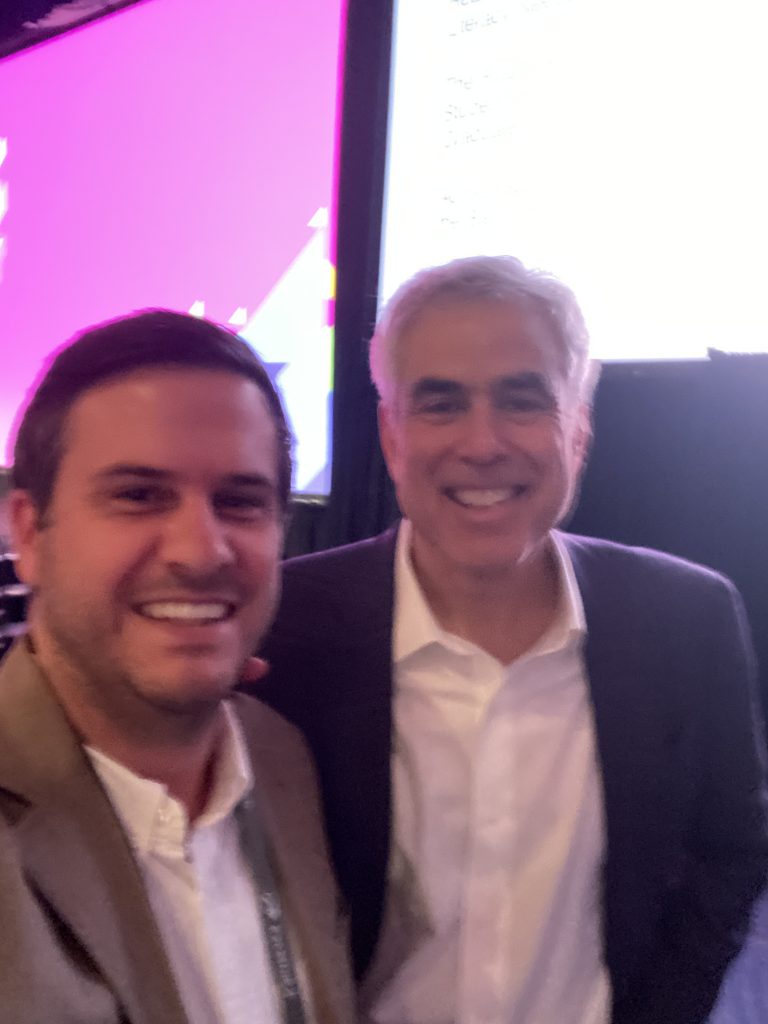Last week, Thinking Nation’s executive team headed to Atlanta, GA for the 15th Annual National Summit on Education hosted by ExcelinEd. Each year at ExcelinEd, policy makers, nonprofits, and other education organizations get together to talk to and learn from each other on how we can build an education system that prioritizes students over systems. I left feeling both inspired and challenged in and I am looking forward to integrating some of the takeaways into our own work at Thinking Nation. Today, I’d like to highlight two of the keynote addresses from the conference that equally inspired and challenged me.
Jonathan Haidt has been inspiring me with his research and writing for the better part of the last decade. So, as you can imagine, when I learned that he would be at the conference, I was excited for what he would focus on. In the past few years, his book The Righteous Mind gave me a concrete way to understand how people come to different political views. His research is very much aligned to the historian’s chief job: to understand people from a time and place not like our own. In 2018, he and Greg Lukianoff wrote The Coddling of the American Mind. Once again, I was taken by their findings. This time, he explored “How Good Intentions and Bad Ideas” (chiefly at universities) “Are Setting Up a Generation for Failure.” I encourage all of us who work in education to read it.

For the past couple of years, Haidt has built off that research and explored the specific impact of social media on our younger generations. Thus, in his talk for us, he introduced some of his new findings that will be in her newest book, The Anxious Generation, coming out in Spring 2024. As he’s written elsewhere, he pointed out that social media is producing much more harm than good, especially for younger users, and especially for younger female users. Second, he called on the audience, many of which have the power to introduce corresponding legislation in their states, to “get phones out of school now.” His ExcelinEd presentation provided compelling findings that demonstrate the negative impact of screens in school. Both he, and the next speaker I’ll highlight, Arthur Brooks, noted that at the schools that they teach at (NYU and Harvard Business School, respectively) do not allow devices in their classrooms. If these elite institutions recognize the need for analog classrooms, we all must consider the ramifications of our own technological choices in the classroom.
Of course, as an organization, we have built an entire web-based platform for teacher and student use. This complicates things. At Thinking Nation, we recognize just how much technology can help us shift the paradigm of social studies education. Still, we know that not all classrooms operate the same. This is why all of our resources are available to our teachers both to assign directly on our platform, or to download as PDFs for student use. Technology can expedite growth but we also must be realistic about the times that it is a growth inhibitor.
The second speaker I’ll highlight here is Arthur Brooks. Brooks has become a mainstay in my weekly reading over at The Atlantic with his Thursday “happiness” column: How to Build a Life. Not to be confused with that overly-optimistic friend we all have that secretly makes us want to throw up, Brooks’ columns and research feels both authentic and practical.
Brooks’ talk challenged us at ExcelinEd to think about how we can teach happiness to our students and he gave us very practical approaches to do so. First, he highlighted that happiness is comprised of three things: enjoyment, satisfaction, and meaning.

While each of these three things are important on their own, it is when they work in concert with each other that we experience happiness. He continued to give us at ExcelinEd practical outlines and activities to promote self-awareness and happiness, many of which can be done with students. But it was his two questions he left for us to answer that stuck with me the most. He said that the mere ability to answer the following two questions are the best indicator to whether you have found meaning in your life. One’s answer to those questions doesn’t matter as much as the sheer ability to answer them. The questions?
- Why am I alive?
- For what would I be willing to die, today?
Brooks continued to challenge us, but this is a good spot to transition to the other topic of today’s blog: Thanksgiving. Before I do though, whenever I travel for Thinking Nation, I like to prioritize at least one historical landmark. So, thank you ExcelinEd, for giving me the ability to see Martin Luther King, Jr.’s birth home and Ebenezer Baptist Church. MLK was a model for us of how to best be an American and it was special to visit those sites.

MLK’s Birth home

The original Ebenezer Baptist Church
Thanksgiving
Thanksgiving is a special holiday filled with historical tension. While it is worth exploring the tensions of the ethnic roots of some of the holiday traditions, today (as I’ve done in the past), I’d like for us to merely consider the purpose of the day: to give thanks. At the heart of gratitude is humility. We cannot be thankful for anyone or anything without acknowledging that others help us. A humble person gives thanks.
History, with its core purpose to be the understanding of people and places not like our own, is a discipline rooted in humility. As I wrote in the blog linked above:
“With no urgent need to use the past for present benefits, historians can humbly try to understand the past rather than co-opting it for a specific purpose or use. This intellectual humility can lead to an intellectual gratitude.”
This intellectual gratitude is embedded throughout our resources. We challenge students to understand diverse perspectives, identify historical significance, and take on historical empathy. These tools, inherent to our discipline, is why we believe that our curriculum, assessments, and professional development can support teachers in cultivating thinking citizens.